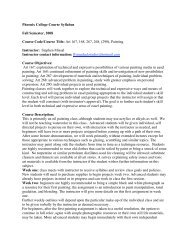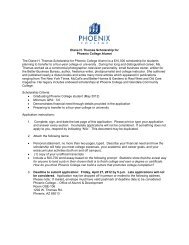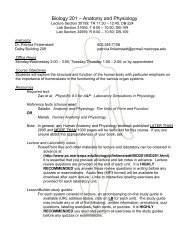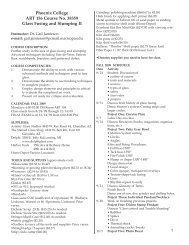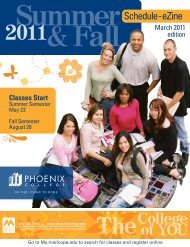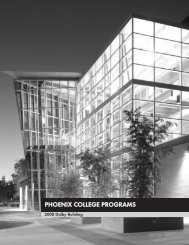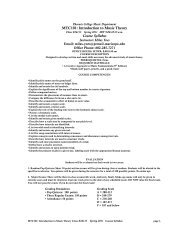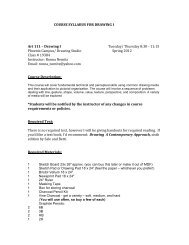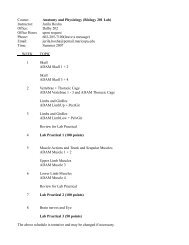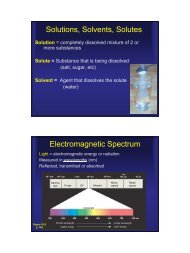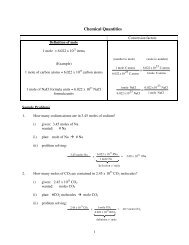Phoenix College Catalog 2009-10
Phoenix College Catalog 2009-10
Phoenix College Catalog 2009-10
You also want an ePaper? Increase the reach of your titles
YUMPU automatically turns print PDFs into web optimized ePapers that Google loves.
304 | <strong>Phoenix</strong> <strong>College</strong> <strong>2009</strong>–20<strong>10</strong> CATALOG<br />
Course Descriptions<br />
NUR – Nursing Science:<br />
Basic<br />
NUR151<br />
Nursing Theory and Science I<br />
<strong>10</strong> credit(s) 20 period(s) lecture & lab<br />
Introduction to fundamentals of nursing<br />
theory and practice utilizing critical thinking<br />
based on the nursing process and principles<br />
of evidence based practice. Focus on<br />
meeting basic human needs within the<br />
wellness/illness continuum. Theoretical<br />
concepts related to holistic care of well,<br />
geriatric, and adult clients. Provides safe<br />
nursing care to clients with selected<br />
alterations in health. Introduction to<br />
professional nursing practice. Applies<br />
concepts of health promotion, disease/<br />
illness prevention. Provides care based upon<br />
integration of pathophysiology, nutrition,<br />
communication and physical, biological, and<br />
psycho-social sciences. Uses information<br />
technology in performing and evaluating<br />
client care. Prerequisites: Admission into<br />
the Nursing Program.<br />
NUR158<br />
Nurse Assisting<br />
6 credit(s) <strong>10</strong> period(s) lecture + lab<br />
Introduction to the role of the nursing<br />
assistant for clients across the wellness/<br />
illness continuum within the nurse assisting<br />
scope of practice. Includes basic problem<br />
solving processes specific to meeting the<br />
basic and holistic needs of clients,<br />
therapeutic communication skills essential<br />
for the nursing assistant, interventions to<br />
ensure the needs and safety of the client,<br />
specific types of diseases, conditions and<br />
alterations in behavior of the client, and<br />
principles of nutrition and fluid balance.<br />
Focus is on special needs of the elder client<br />
in the acute and long-term care settings, and<br />
basic emergency care skills and procedures.<br />
Provides opportunity for the development of<br />
clinical competency in the performance of<br />
selected nurse assisting skills and procedures<br />
through participation in the care of clients.<br />
Prerequisites: Completed Health and<br />
Safety Documentation Form (proof of<br />
immunity or immunizations for Rubella,<br />
Rubeola, Mumps, Varicella, Hepatitis B, Td,<br />
current TB testing, current HealthCare<br />
Provider CPR card and current Fingerprint<br />
Clearance Card) and completed Health Care<br />
Provider Signature form.<br />
NUR171<br />
Nursing Theory and Science II<br />
8 credit(s) 16 period(s) lecture & lab<br />
Application of nursing theory and practice<br />
utilizing critical thinking based on the nursing<br />
process and evidence based practice.<br />
Holistic nursing concepts of health<br />
promotion, disease/illness prevention, and<br />
health restoration for adult and geriatric<br />
clients. Role development as the professional<br />
nurse member of the health care team.<br />
Participation in client teaching and discharge<br />
planning. Application of previous knowledge<br />
of physical, biologic, psycho-social sciences,<br />
and the cultural and spiritual aspects of<br />
nursing care. Application of nursing concepts<br />
in the development of plan of care to include<br />
pathophysiology, nutrition, pharmacology,<br />
and skills in communication. Uses information<br />
technology in planning, documenting, and<br />
evaluating client care. Prerequisites:<br />
NUR151 or permission of Nursing<br />
Department Chairperson.<br />
NUR241<br />
Nursing Process and Critical Thinking<br />
IV<br />
4 credit(s) 4 period(s) lecture<br />
Nursing and critical thinking strategies for<br />
complex holistic needs of high-risk clients<br />
with multi-system health alterations.<br />
Includes perinatal, newborn, pediatric, and<br />
adult clients in acute care settings.<br />
Continuation of role development of the<br />
professional nurse. Integrates concepts of<br />
nutrition, communication, health promotion,<br />
and advanced pathophysiology. Application<br />
of previous knowledge of physical, biologic,<br />
social, and nursing sciences. Prerequisites:<br />
NUR231, NUR237, and (NUR238 or<br />
NUR239). Corequisites: NUR248 or<br />
permission of Nursing Department<br />
chairperson.<br />
NUR248<br />
Nursing Science IV<br />
5 credit(s) 15 period(s) lab<br />
Synthesis of nursing concepts. Provides<br />
nursing care for high-risk newborn, pediatric,<br />
perinatal, and adult clients with multi-system<br />
alterations in health. Emphasis on leadership<br />
and management roles of the nurse. Includes<br />
a preceptorship experience to facilitate role<br />
transition from student to graduate nurse.<br />
Integrates concepts of nutrition,<br />
communication, health promotion, and<br />
advanced pathophysiology. Prerequisites:<br />
NUR231, NUR237, and NUR238.<br />
Corequisites: NUR241 or permission of<br />
Nursing Department Chairperson.<br />
NUR251<br />
Nursing Theory and Science III<br />
8 credit(s) 16 period(s) lecture & lab<br />
Application of critical thinking strategies<br />
related to holistic care of the newborn,<br />
pediatric, and childbearing clients. Integration<br />
of concepts related to holistic care of adults<br />
and geriatric clients with selected acute and<br />
chronic alterations in health. Integration of<br />
professional nursing standards in role<br />
development. Utilization of previous<br />
knowledge of physical, biologic, psychosocial<br />
sciences, and the cultural, spiritual<br />
aspects of nursing care. Integration of<br />
concepts of nutrition, pharmacology,<br />
communication, health promotion, and<br />
pathophysiology into nursing care.<br />
Prerequisites: (BIO202, BIO205, and<br />
NUR171) or permission of Nursing<br />
Department Chairperson.<br />
NUR271<br />
Nursing Theory and Science IV<br />
7 credit(s) 13 period(s) lecture & lab<br />
Integration of critical thinking strategies for<br />
complex holistic needs of high-risk clients<br />
with multi- system health alterations.<br />
Application of strategies related to holistic<br />
care of the client with psychiatric/ mental<br />
health disorders. Introduction to community<br />
based care. Assimilation of professional role<br />
into practice. Evaluation of care based on<br />
the knowledge of physical, biologic, psychosocial<br />
sciences, and the cultural and spiritual<br />
beliefs of clients. Development of nurse<br />
leadership and management roles.<br />
Integration of concepts of nutrition,<br />
pharmacology, communication, health<br />
promotion, and pathophysiology into nursing<br />
care. Prerequisites: NUR251 or permission<br />
of Nursing Department Chairperson.<br />
NUR291<br />
Nursing Clinical Capstone<br />
2 credit(s) 6 period(s) lab<br />
Synthesis of the nursing process to facilitate<br />
role transition from student to graduate<br />
nurse within a preceptorship experience.<br />
Development of nurse leadership and<br />
management roles. Prerequisites: NUR271<br />
or permission of Nursing Department<br />
Chairperson.<br />
NVH – Navajo Humanities<br />
NVH245<br />
Navajo Culture and Heritage<br />
3 credit(s) 3 period(s) lecture<br />
Survey of the Navajo people, including their<br />
history, culture/aesthetics, education,<br />
spirituality, and language. Prerequisites:<br />
None.



